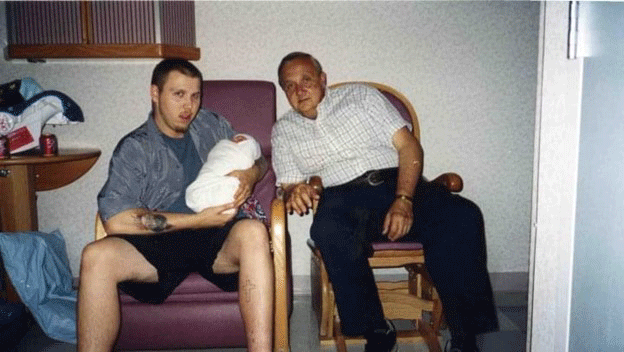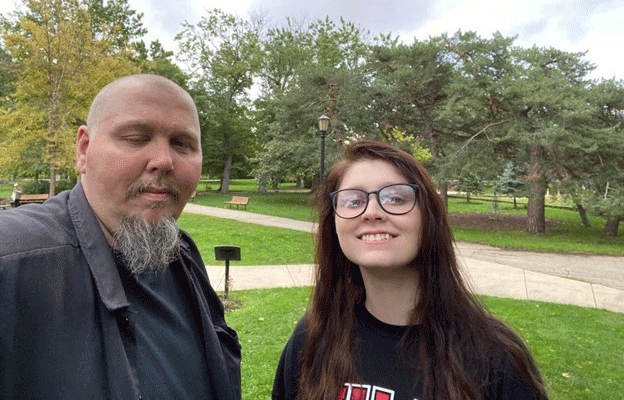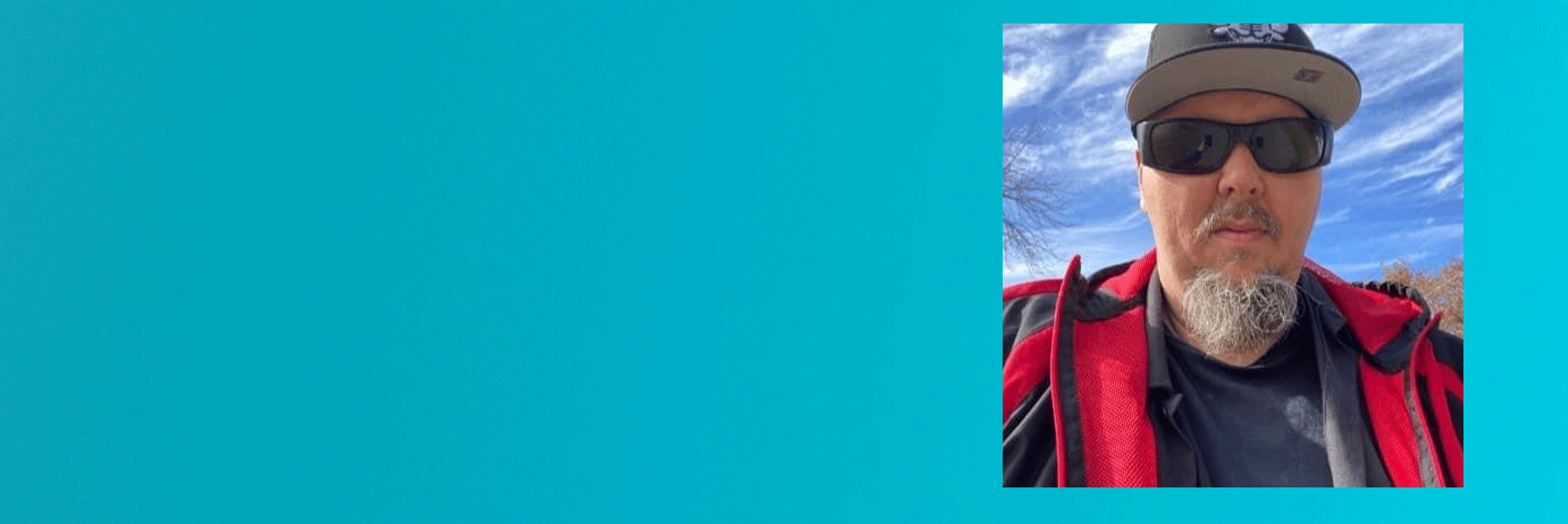My name is Scott Bejda, and I am a longtime music and reality journalist from Illinois living with myasthenia gravis. Most people get MG later on in life, but my symptoms started when I was 21 years old in 1999.
At this point, I was already doing album reviews with Murder Dog Magazine and had just started to interview various artists within the world of hip hop when I developed double vision and muscle weakness.
At first, they could not tell me what was wrong and suggested it was third nerve palsy, but I was now impaired and had to figure out how to type very long interviews with double vision. I also noticed it was becoming difficult to talk, swallow food without choking, or even smile. I knew something far worse than third nerve palsy was at play and had to get to the bottom of it.
I went to an eye doctor who took one look at me and said he believed I had myasthenia gravis and needed to see a neurologist. Right away I had many questions. My dad researched MG and what he told me about the disease had me scared. Right away depression, anxiety, and fear set in, but it all made sense because the difficulty swallowing, double vision, muscle weakness, feeling tired, and anxiety were a mystery to me up until that point.
Finally, I went to a neuromuscular clinic in St. Louis, where a diagnosis was confirmed. It was a blessing and a curse because at least now I knew what was wrong, but I was about to be treated with some very harsh medications, like azathioprine, which can increase your risk of developing lymphoma, among many other things. When there was no response to this treatment, I started to sink into a depression.
I thought to myself, “Here you are reviewing multi-platinum albums such as DMX's Flesh of My Flesh, his second chart-topping album within a year, and now you are expected to interview some of the biggest stars in the world of hip hop, but how will you accomplish this with double blurry vision and extreme headaches?”
I started to interview the likes of Snoop Dogg, 50 Cent, Danny Trejo, and many others, but typing those interviews out was almost impossible.
Instead of finishing up an interview in a day, it now took a week or more. I was getting wicked headaches; I had to keep an eye patch on one eye and hold my other eyelid open while typing with one hand.
I would have to hit the “stop and play” button on my recorder every few seconds because I was constantly unsure of what I typed and if it was correct. This was frustrating beyond belief, plus at the time I was also a new father trying to navigate how I would provide for my daughter.
I wanted to try to do what I could to get better. I knew there was no cure, but I had to do something. I ended up going on several different kinds of medication, including methotrexate and pyridostigmine (Mestinon). My dad was told by one doctor that I was young and could handle the tough side effects. I started feeling like a lab rat. It seemed like nothing was going to work.
My career in the world of hip hop was taking off, and I was feeling hopeless at the same time.
Here I was in my early twenties, my work was getting known all over the world, but I was secretly battling a potentially life-threatening disease. The income at times was good, but there would be dry spells where I needed to make more money to survive. I also could no longer work in factories due to muscle weakness, overall tired feelings, and the depression that was setting in again (or maybe it never left).
As my daughter started to get older, I decided to remain positive no matter what. I remember when my dad asked one of the doctors what could make this worse, and he told us stress.
I had to let the depression, stress, and fear go.
I still suffered from terrible anxiety due to the neuromuscular effects of MG, but I had to cope with it the best that I could. This led to countless trips to the ER for EKGs and other tests because I thought I was having heart attacks and strokes. Even to this day, I still go to the ER at least a couple times a year thinking I'm about to drop dead.
I ended up becoming a patient at a muscular dystrophy clinic for several years so they could keep an eye on my symptoms and monitor the progression of the disease. After this clinic closed down, I was in constant search of a doctor close to home who could keep an eye on me, but all I ever encountered was closed doors and disappointments.
One neurologist told me that if she ever had to put me on a ventilator she could not guarantee she would be able to get me off of it. That was discouraging to say the least. Another doctor promised me at the first visit that he would do his best to help me, but during the second visit, he admitted I didn't have adequate insurance for such a small hospital to be much help.
My career was still stacking up many accolades, but not the type of income that should have come with them. I started one of – if not the – first hip hop podcast, Murder Master Music Show, and was carving out something that would later become a trend amongst many.
Long before YouTube or the other, bigger well-known podcasts, I started the blueprint for them to follow. But since they had more revenue and staff, and were not fighting through constant double blurry vision and a slew of other MG symptoms, it was almost impossible to keep up, but somehow I did.
The competition, such as blogs, websites, and other outlets, were constantly quoting content from my shows. I ended up landing on all the major hip hop media outlets as well as the regular new platforms. My interviews hit places like People, the New York Post, and just about anywhere else you can think of.
How did a guy with MG have one of the most quoted podcasts in rap? It was because I was relentless and knew I was in this for the long haul. I was the Rocky of Rap – I took beating after beating but kept moving forward.
In 2018 my biggest advocate was nearing the end of his ten-year battle with stage 4 prostate cancer. On November 13, 2018, my father William Bejda passed away at home. I was crushed! He was my best friend, my hero, and stood by my side throughout my illness, even when he was facing death himself. Early on he went to all of my doctor’s appointments, witnessed the sometimes painful tests and treatments, and now he was gone.

Less than a year after he passed away from cancer, my mother Linda came down with breast cancer. My mom also had an autoimmune disease she was battling called lupus.
But that's just the beginning because they say bad news comes in threes, and that was no lie. My daughter, who was 18 or 19, developed an autoimmune disease called hypothyroidism or Hashimoto's disease.
How could I help but not be depressed? I had to suffer in silence because I had to be strong for them.
It was the beginning of 2020, and the pandemic had presented a new problem on many levels.
When I was first diagnosed with MG my worst fear was being placed on a ventilator, and now this thing called COVID was causing people to be placed on ventilators all across the globe. I lived in the small town of Fairfield, Illinois, in Wayne County, and unfortunately, the majority of the population thought it was no big deal. It got to the point where doctors were pleading with the public to do their part, but unfortunately, it fell on deaf ears.
This was an extremely unsafe place to live while battling a life-threatening illness and, in our house, there were three of us that fell under that category. It was a slap in the face to people like us that so many chose politics over safety.
My mom had just finished chemo and radiation, my daughter was battling hypothyroidism, and most of the people in our area didn't care if we lived or died. Businesses even put cryptic messages on signs such as, "Don't believe in COVID's numbers, believe in God's numbers!" Masks were scoffed at and people like us were ridiculed for wearing them, but all we wanted to do was survive. We heard the, "Don't live in fear!" rhetoric, but I had lived with the fear of being placed on a ventilator for twenty years.
Not to mention my vision was getting worse and so were the press releases I sent out for my podcast. Various writers and peers would make fun of my grammar and spelling errors, but they had no idea I was doing everything in my power just to type them up.
Depression was gone, but anger was brewing inside of me. I was sick of the ridicule, sick of the lack of concern for people like my mom, daughter, and myself. I had to contain the anger and use it as motivation to keep moving forward.
Finally, in 2024 I made up my mind to tell my listeners and supporters as well as the world that I was living with myasthenia gravis. For far too long I was being selfish by not sharing my story. The older I got, the more I wanted to help others. I reached out to several of the media outlets, when Chuck Creekmur aka Jigsaw, co-founder of Allhiphop.com, one of rap’s first online media platforms, decided to cover my story. I knew this was much bigger than myself, and it made me feel good to try to inspire others to not give up.
I know many of you are going through this or much worse. I want to use my platforms to raise awareness. You are not alone! Thank you for taking time out to read about my myasthenia gravis journey, and I encourage you to be an advocate.


